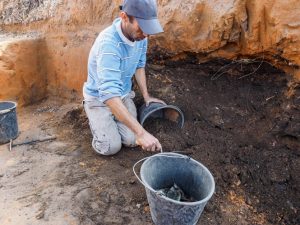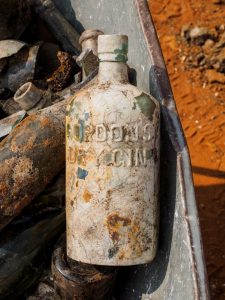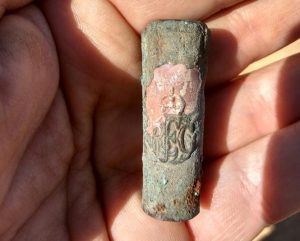Excavations prior to the construction of a highway near Ramla in Israel revealed a rich cache of liquor bottles left by British soldiers during World War I.

The excavations were conducted in the fields of Kibbutz Netzer Sereni before the construction works of Highway 200. Among other finds, such as flint tools from the Palaeolithic, being 250000 years old, archaeologists discovered hundreds of bottles that are over 100 years old. The vessels were used and left by British soldiers during World War I.

Archaeologists believe that the site where the bottles were found consisted of remains of a building, which served the British army. It is known, that the activity of the British army consisted of non-combat operations, such as gathering intelligence regarding number of soldiers, direction of attack, and the results of the battle. The building probably served as a barrack.

This structure was used for agricultural purposes in the Ottoman period, and during World War I the British converted it for military use and soldiers were housed in it. Inside the building archaeologists discovered dozens of uniform buttons, belt buckles, parts of riding equipment, and other artefacts that were the property of the British soldiers. According to the researchers the building caught fire and collapsed for a reason which at this point is unclear. The place where the soldiers discarded debris was revealed just a few meters from the building. The researchers were surprised to discover that along with broken crockery and cutlery there was an enormous number of soft drink and liquor bottles. In fact, about 70 percent of the waste that was discarded in the refuse pit were liquor bottles.

According to archaeologists this is the first time in the history of archaeology in Israel in which an assemblage of hundreds of glass bottles from a British army camp from World War I was uncovered. The glass bottles, which contained mainly wine, beer, soda and alcoholic beverages such as gin, liqueur and whiskey, came from Europe to supply soldiers and officers in the camp. Another interesting finds was the tip of a swagger stick that belonged to a Royal Flying Corps officer. Swagger sticks such as these were usually carried by senior officers as a symbol of authority. Its tip is made of silver and it is stamped with the symbol of the corps and the initials RFC.

The artefact is believed to be he first item of its kind ever found in Israel. It may have been left by a member of the Egyptian Expeditionary Force, a British Empire military formation, which under the command of General Edmund Allenby conquered the area around the towns of Lod and Ramla in 1917. The army made camp for nine months in the area where the archaeological excavation took place with the headquarters at Bir Salam – Ramla Camp and Sarafand Camp.
(after Clara Amit, Assaf Peretz, Israel Antiquities Authority, Haaretz, Arutz Sheva & Jewish Press)